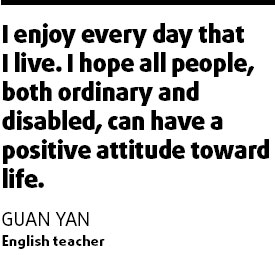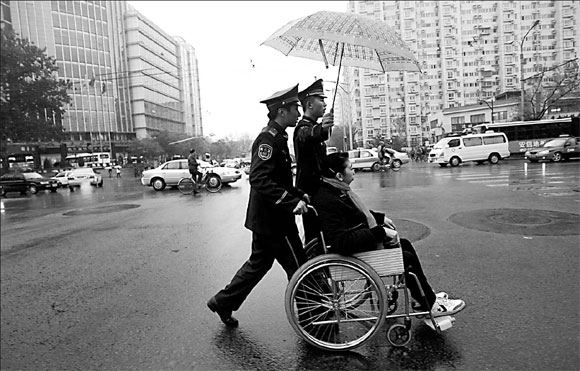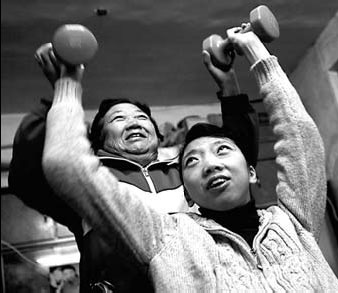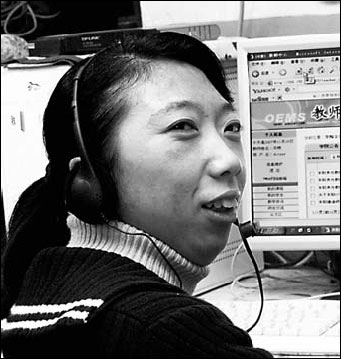A mirror smiles back
|
Foreign embassy guards help volunteer English teacher Guan Yan to the classroom. |
Those who know Guan Yan, a candidate for torchbearer at the Beijing Olympic Games, are impressed by her bright smile and genial disposition - as her name, yan (which means lovely), suggests.
The 35-year-old Beijing resident, who has been paralyzed from the waist down for the past 21 years, firmly believes in the saying: "Life is like a mirror, if you smile at it, it will smile back; and if you cry before it, it will do the same to you".
Shortly after Guan entered middle school in 1986 she started falling over a lot, for unknown reasons. Four days before her 14th birthday, she was diagnosed with spinal cord compression. The doctor said she would spend the rest of her life in a wheelchair.
"The moment I heard the news, I thought, must I stop going to school? I haven't even joined the Youth League yet," she says.
She did leave school and underwent several operations over the following years, none of which helped her walk again.
"I felt like a swallow whose wings are broken and drops from the sky."
|
Guan Yan does exercises with her mother's help. |
Guan recalls her mom's comforting words: "Never mind, it's not so bad. Just live happily as you did before."
She disliked being an object of pity, however, and rarely went out. The radio and TV were the main ways in which she kept in touch with the world.
One day, she saw an English learning program for beginners on China Central Television (CCTV), which aroused her interest in learning English.
"I liked English, even though I had only learned a little in middle school," she says.
She studied under the direction of the TV program for a year. Then she continued studying, this time with a middle-level program on China National Radio (CNR).
In 1994, she passed the entrance examination for a cooperative training program organized by CNR and Dalian University of Foreign Languages, in Northeast China's Liaoning Province.
"I was overwhelmed with joy when I received the admission notice from Dalian. I never expected to pass the exam and attend school again. I didn't think the school would want me if they knew I was paralyzed," she says.
But the college did admit her and provided a single dorm on the first floor so her mother could stay and take care of her.
"I had never been out of Beijing before. The teachers and classmates were very nice, patient and thoughtful. They opened a window to a dynamic society for me."
Guan devoted most of her two years in Dalian to catching up academically with others.
"I soon realized the shortcomings of being self taught. Since I didn't have a teacher to help me, or any classmates to practice with, what I had learnt was far too restricted."
She found that she could hardly understand what her classmates were saying when they practiced dialogue during class.
Guan felt embarrassed. She practiced using tapes as much as possible and stayed up late studying. She also had to worry about other courses like history and politics, which her classmates had learned in high school. Being away from school for so long, she found she had to start all over again.
Two years after she graduated, Guan enrolled at the prestigious Beijing Foreign Studies University, in 1998. She took classes just twice a week, but it was a distant and expensive journey from her home to school on the other side of the city.
Guan's mother would push her wheelchair for up to an hour. Then they would take a cab, but got out when the fee reached 15 yuan ($2) - the limit of their small budget - before walking the rest of the way.
"A friend of mine jokes that the money I spent on taxis during my three years of study could have bought me a counterfeit college diploma."
|
Guan Yan works at a distance-learning organization, helping some 8,000 students. Photos by Guo Tieliu |
Now she attends a postgraduate course in linguistics on Saturday at Renmin University, and pays about 35 yuan ($5) for each taxi ride.
"I hope Beijing will introduce buses that can accept wheelchairs as soon as possible," she says.
Guan Yan has been a private English tutor for nearly 10 years. This April, she became a teacher at the National Center for Open and Distance Education, a distance learning organization. Her work includes arranging teaching-and-learning plans, answering questions and assigning exams for her 8,000 students at the College of Long-Distance Education at Dongbei University of Finance and Economics.
"It is a compelling job. Sometimes I feel envious of my students, for they can receive more comprehensive English training with the help of the Internet than I did," she says.
"My greatest satisfaction in life comes from teaching students of different ages and from all walks of life," she adds.
Every Thursday, Guan is wheeled into a classroom in Beijing's Dongsi Shisantiao community. Before her, around 40 residents, mostly elderly, are learning their ABCs with the help of a textbook, which the government has issued in response to the unprecedented enthusiasm for learning English before the Olympic Games.
As usual, Guan starts the class, leading her students pronounce phonetic symbols. Then she points to her face to describe the five senses in English. The students then try to imitate her.
"The neighborhood where I live is close to several tourist spots, such as the Lama Temple. Residents are keen to know how to help foreign tourists," says Guan, who also gives free English classes to the Armed Police soldiers guarding foreign embassies in Beijing.

Ever since she was named as a candidate for carrying the Olympic torch, Guan has paid more attention to physical exercise. Every day, after she gets up, she asks her mother to massage her legs, stands up for an hour and works on strengthening her arms by lifting dumbbells. The final torch bearer will be announced early next year.
"Many people ask about my future plans. But I am not the kind of person who has a clear scheme. I don't want to give myself too much pressure, although I have already experienced it with the postgraduate course, which turned out to be much more difficult than I thought.
"I enjoy every day that I live. I hope all people, both ordinary and disabled, can have a positive attitude toward life," she says.
(China Daily 12/26/2007 page20)

















